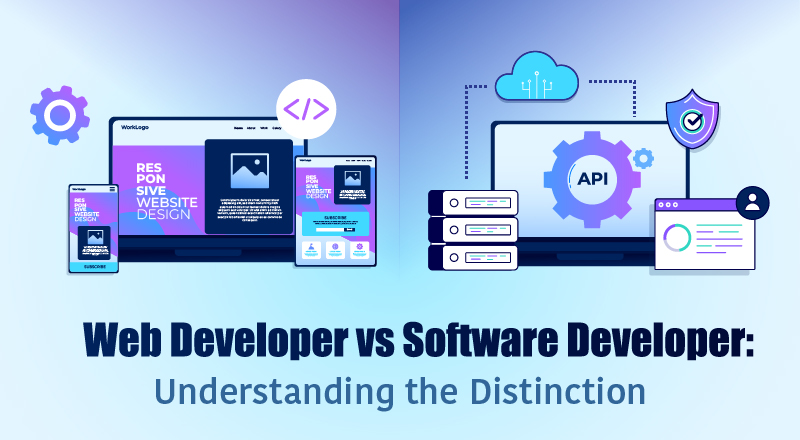Web Developer vs Software Developer: Understanding the Distinctions
Navigating the ever-evolving tech landscape can be perplexing, especially when it comes to understanding the distinctions between a “web developer” and a “software developer.” These titles, seemingly interchangeable, harbor unique nuances that set them apart in the dynamic world of coding.
Join us on this journey as we unravel the intricacies that define these roles. Our focus is on breaking down the specific skills, tools, and objectives that differentiate web developers from software developers.
By exploring the nuanced comparison of web developer vs software developer, we aim to provide clarity on how these professionals collaboratively shape the digital experiences that have become integral to our daily lives.

What is a Web Developer?
Web developers are responsible for building websites — and their work can be technical, creative, and highly rewarding. Web developers are in the front line of the internet age. The websites we browse, the online shopping we do, and the news we peruse online are all made possible by web developers who design, build, and implement websites.
They use technical skills to develop the website applications and code and use creative thinking skills to make the website look and feel. Web developers may work exclusively on front-end code, back-end code, or both. These professionals may work independently on a freelance basis or with marketing or IT departments.
Web Developer Roles and Responsibilities
- Creating a website layout using HTML/CSS, JavaScript, PHP, and other relevant programming languages.
- Working together with web designers (to meet their visual expectations), developers, and stakeholders.
- Evaluating code to see if it’s on par with industry standards.
- Troubleshooting website bugs.
- Testing website quality to ensure it’s running efficiently.
- Writing and designing website content.
- Making use of a variety of tools to monitor website traffic, insights, and performance.
- Staying up to date on technology in general.
- Providing technical support for website deployment.
Types of Web Developers:
Web developer jobs differ the most depending on what part of the website they’re working on. The three main types of developers include front-end, back-end, and full-stack.
Front-End Developer:
Front-end developers work on the user-facing side of a website, which is what we see when we click on a website from our phone or computer. They’re concerned with how the site looks and feels, which involves its design and how users experience it. This is a more creative role than other areas of web development but still involves technical skills to build the website’s look.
Back-End Developer:
Back-end developers work to make the front end of a website possible by writing and testing code. Their work isn’t visible to clients and users but makes the website functional and secure. For example, they might work on data storage, cybersecurity, site efficiency, and site maintenance.
Full-Stack Developer:
Full-stack developers have the best of both worlds — they work on front-end and back-end website development. Their knowledge base extends to both the user-facing and server sides, which means they can work on any task in the web development process.
What is a Software Developer?
Software Developers, on the other hand, are responsible for creating more complex applications and programs for computers and mobile devices.
Software developers – sometimes referred to as software engineers – are the masterminds behind a variety of programs. Software developers design, create, evaluate, modify, maintain, and configure software solutions for computer systems to meet user needs and client specifications.
They may also oversee the entire software development lifecycle, conduct research, debug code, deploy upgrades, and build diagrams and models to communicate results.
They use a variety of programming languages such as Python, C#, Java, SQL, etc. for application development.
Software Developer’s Role and Responsibilities:
- Research, gather, and define business/software requirements.
- Develop scalable and efficient code, based on user needs.
- Test and debug code for any issues.
- Communicate and collaborate with developers and UX designers.
- Determine which software tools, systems, and components to use.
- Monitor the performance of all existing systems.
- Upgrade and improve existing systems.
- Ensure the integrity of the QA standards.
- Write technical documentation.
- Gather user feedback for points of improvement.
Types of Software Developers:
Software development is a broad field, and developers often work on large, complex projects, making it difficult to have every required skill and an in-depth understanding of all development environments.
This is why software developers fall into two main classifications:
- Applications Software Developers
- Systems Software Developers
Both groups perform similar tasks but focus on different aspects of development and computer programs; some focus on a specific program or application, while others create systems that power other programs or networks. Regardless, career prospects for all types of developers are in abundance.
Within the two main groups of software developers, there are different specializations that tech pros might pursue based on their specific skill sets and/or interests.
Applications Software Developers:
Applications software developers focus on designing and developing applications for computers and mobile devices. They might create custom programs for a specific customer to be sold, an organization’s internal network, or for the general public.
Types of applications software developers include:
- Front-end developers
- Back-end developers
- Full-stack developers
- Web developers
- Game developers
- Mobile app developers
- Solution architects
- Desktop software developers
Systems Software Developers:
Systems software developers are responsible for building, overseeing, and optimizing operating systems-level solutions for consumers or enterprise organizations, as well as the implementation and documentation of system architecture.
Operating systems are what keep computers functioning; they serve as an interface between a user and computer hardware, manage system resources, and provide a platform for applications and programs to run on. It can be found in most of the technology we use, so it’s crucial to have tech pros who are skilled in building and ensuring that those systems remain functional.
Types of Systems Software Developers Include:
- Security developer (DevSecOps)
- AI/machine learning engineer
- DevOps Engineer
- Embedded system developer
- Operating systems developer
- Data Engineer
Web Developer vs Software Developer: Major Differences
| Parameters |
Web Developer |
Software Developer |
| Who |
Creates a website or a set of web applications. |
Creates any type of software. |
| Architecture |
The applications developed by web developers are entirely client-server-based. |
Software developers develop 1) client or 2) client-server-based applications. |
| Education |
Web developers are from a range of educational backgrounds, including self-taught, certification courses, or formal education. |
Require a formal degree in computer science, software engineering, or a related field. |
| Skills Required |
Expertise in web development technologies like HTML, CSS, JavaScript, and web frameworks. |
Strong knowledge of programming languages, software development methodologies, software design patterns, database management systems, and algorithms. |
| Tools and Technologies |
Web development tools, frameworks, and libraries. Examples are React and Vue. |
Integrated development environments, software development kits, and debugging tools. |
| Job Titles |
Web Developer, Front-end Developer, Back-end Developer, Full-stack Developer. |
Software Engineer, Software Developer, Software Architect. |
| Industry demand |
High demand in industries that require web-based solutions, such as e-commerce, media, and social networking. |
High demand across a range of industries, including finance, healthcare, travel, and government, among others. |
| Salary |
Median salaries for web developers can vary depending on specialization and experience but are generally lower than for software engineers. |
Typically have higher median salaries than web developers, reflecting the higher educational requirements and broader scope of work. |
| Career growth |
Can advance to senior and leadership roles, such as technical lead or development manager, or product manager. |
Can advance to senior and leadership roles, such as software architect, CTO, or engineering manager. |
| Development platform |
Build an app that is compatible with every browser. |
Build an app with compatibility across various platforms or operating systems (OS). |
| Easy to learn |
Web development is quite easy to learn. |
Software development is hard to learn when compared with web development. |
Web Developer vs Software Developer: Similarities
| Languages used |
Both use the same digital programming and coding languages. |
| Skills |
They have problem-solving, creativity, and communication skills. |
| Flexibility |
Both can work remotely and do freelance work, so they enjoy added flexibility and are not limited to their location. |
| Teamwork |
Both often work in teams to plan, design, and develop projects. They must collaborate effectively with others, receive feedback, and participate in meetings. |
| Attention to Detail |
Both must identify and track small coding issues. These professionals must also shift focus back and forth from the big picture to the minute details. |
Web Developer vs Software Developer: Conclusion
Software developers vs Web developers are both significantly crucial in their places. However, software developers create multiple software or computer platforms, whereas web developers create numerous websites and applications.
SPEC INDIA is your trusted partner for AI-driven software solutions, with proven expertise in digital transformation and innovative technology services. We deliver secure, reliable, and high-quality IT solutions to clients worldwide. As an ISO/IEC 27001:2022 certified company, we follow the highest standards for data security and quality. Our team applies proven project management methods, flexible engagement models, and modern infrastructure to deliver outstanding results. With skilled professionals and years of experience, we turn ideas into impactful solutions that drive business growth.







